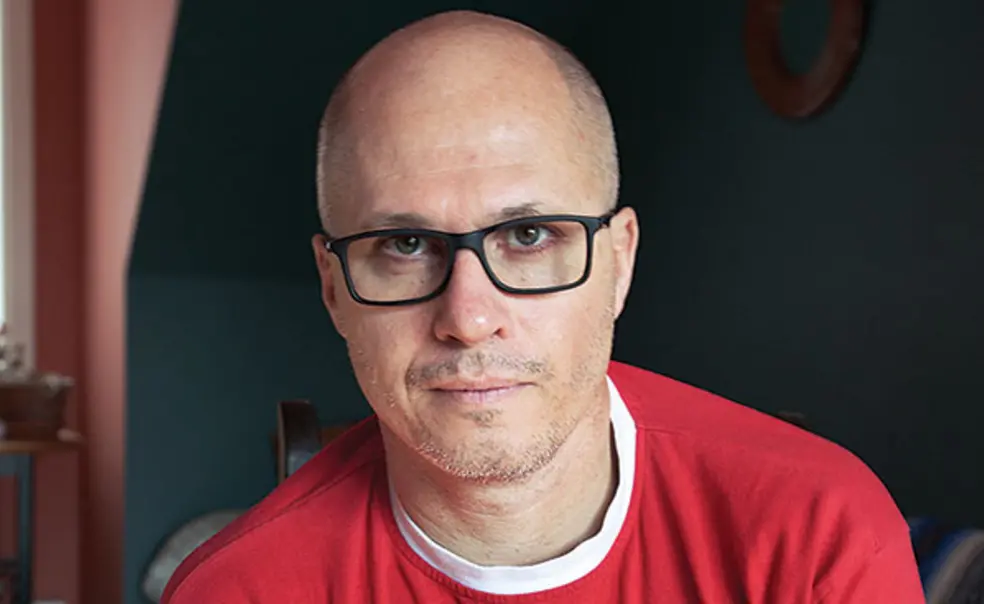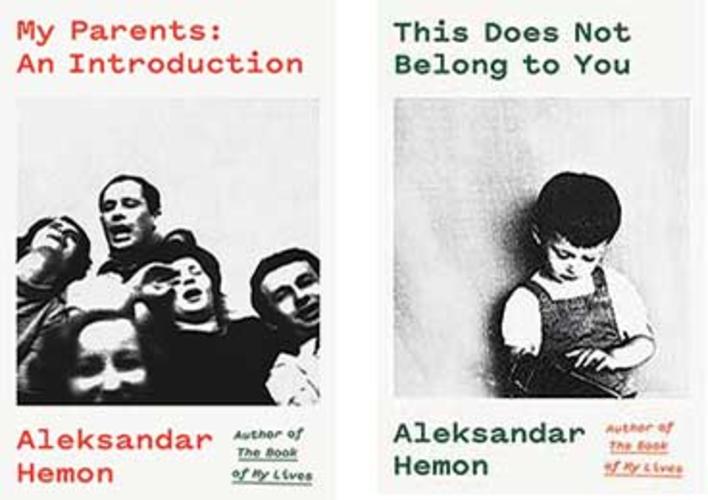In 1992, Aleksandar Hemon traveled to Chicago on a journalistic exchange — and, when his native Bosnia was engulfed by war, found himself stranded. He wrote his first short story in English in 1995. Since then, the literary accolades have flowed, including a 2003 Guggenheim Foundation grant, a 2004 “genius grant” from the MacArthur Foundation, two PEN awards, and two National Magazine Awards. His first novel, The Lazarus Project (2008), was a finalist for both a National Book Award and a National Book Critics Circle Award.
Last fall, Hemon joined the Program in Creative Writing as a professor. His latest work is two conjoined memoirs: My Parents: An Introduction and This Does Not Belong to You (Farrar, Straus and Giroux). The family memoir came first. But as he revisited his childhood, Hemon says, “a lot of strange, interesting and baffling memories popped up,” and he assembled those “fragments and reflections” into This Does Not Belong to You.Organized thematically, My Parents details his parents’ gradual, often difficult adjustment to Ontario, Canada, where they immigrated to escape the siege of Sarajevo. “I’m compelled to claim that their displacement is the central event of their lives,” Hemon writes. The Hemons’ initial isolation was mitigated by the arrival of more relatives. Their finances improved when they were hired as superintendents of an apartment building. His father plunged into bee-keeping, an avocation inherited from his Ukrainian ancestors. And the family found comfort in singing, storytelling, and reminiscences about the past — longtime habits that surely shaped Hemon’s own literary proclivities. “Our history,” he writes, “is a history of unassuageable longing for the home that could never be had.”
Were there specific events that inspired this project?
I come from a family of migrants. All of my books deal with the fact of migration, which is the engine of humanity. More specifically, I wanted to appreciate my parents’ courage and resilience. They lost their home and homeland, and then managed to rebuild their lives in Canada when they were well into their 50s.
How has your parents’ immigrant experience has been typical or atypical?
I can only talk about my family. To a writer, human beings are not statistical data or subjects of study. Every life is full to the brim with being in the world. I would venture to theorize that something happens in migration to the sense of self and, related to that, to the way people remember and tell stories of their lives.
You write candidly about your parents’ marriage and their regrets. How did their tensions affect you?
I would like to think that, because I bore witness to my mother’s struggles, I could better understand what it means to be a woman in patriarchy. The question then was — and still is — what I could do to be a better person, for her and others, including my wife and daughters. On a practical level, there is no gendered division in my family — my spouse and I raise our daughters to know that they can do anything they want and that the only expectations that matter are what they expect themselves to be.
Were your parents reluctant about the project?
Everything in the book has already been addressed in our long, sometimes contentious conversations. We are a very talkative and loving family. The best part of the project was that interviewing them for the book required that I sit and listen to them, which made me love them more.
You paint a brutal picture of boyhood in Sarajevo. How do you think the culture of patriarchy there differs from America’s?
If you grow up as a boy in patriarchy, you’re inescapably socialized in violence, which has many forms, from street fighting to misogyny. I do not think that the U.S. is that far ahead of any other country. But people are not hand puppets — not even men — and there has to be a way to transcend the limits of one’s society, to change it and in doing so change oneself. My sister has taught me a lot in that respect — because of her I know now that we didn’t have the same childhood, and were not, as it were, living in the same place. It was much easier for me.
This Does Not Belong to You is a collection of memories and musings on memory. What impact did writing these pieces have on you?
In this particular case, I’ve made new discoveries about the relation between memory, language, and narration. Language fills out gaps in memory and in doing so turns them into stories. But a narrative is not built upon the foundation of authenticity and truth, but on the logic of storytelling. I can no longer remember what I narrated — I can only remember narrating it. Most of the memories are of the stories about memories.
Interview conducted and condensed by Julia M. Klein
This is an expanded version of a story from the June 5, 2019, issue.













1 Response
Norman Ravitch *62
6 Years AgoGenius!
Polish-born Joseph Conrad wrote very effectively in his acquired English. And this Bosnian seems to have made the linguistic switch as well. I am very impressed. It is hard enough to learn another language and to speak it reasonably well. To write in another language and to do it as well or better than any native -- well, that is genius!